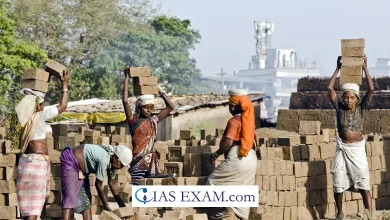National Framework of Early Childhood Stimulation 2024
Syllabus : Social Issues [GS Paper-2]

Context
The National Framework of Early Childhood Stimulation, 2024, highlights the significance of early education in influencing a child’s growth. This framework prioritises children aged birth to three years old and stresses the value of appropriate activities led by parents, anganwadi staff, and ASHA workers to establish a solid base for future learning.
About National Framework of Early Childhood Stimulation 2024
- The National Framework for Early Childhood Stimulation 2024 is a comprehensive guide for caregivers and Anganwadi workers to promote optimal development in children during the crucial early years.
- The framework aims to empower caregivers and Anganwadi workers through ‘responsive caregiving’ and ‘providing opportunities’ for early learning for children from birth up to the age of three.
Objective
- The goal of the framework is to be a developmental pathway that comprehensively covers early childhood stimulation throughout the vulnerable period of time that includes the first three years of life.
- It is set to prevent the child from experiencing the inadequate care and stimulation, which in turn may hamper the development of their cognitive, socio-emotional, language, motor, and creative skills.
- The purpose to put forward the framework is to conduct the caregivers and Anganwadi centre workers to provide individual care and chances of cognitive development, reaching to the best of child development.
- The framework focuses on two key components: supportive childcare and making education implementation for the little children.
Key Features
The framework provides a combination of activities, including:
- In-centre and at-home activities
- Indoor and outdoor activities
- Child-led and educator-led activities
- Robust assessment tools to track child development
Age Range
The framework is designed for children from birth to three years, with activities tailored to specific age groups: 0-6 months, 7-12 months, 13-18 months, 19-24 months, and 25-36 months.
Activities
The framework lists 36 month-wise activities which can be conducted at the home as well in the Anganwadi centres or creches. Activities include:
- Sensory play
- Music and movement
- Storytelling
- Play with toys and objects
- Outdoor play
Implementation
The provisions of the framework, including weekly activity schedules, home visit guidance, assessment tools for tracking child development, etc., will be included in the Poshan Tracker mobile application. This will facilitate easy access and implementation of the framework by caregivers and Anganwadi workers.
Navchetana Curriculum
- Early childhood is a crucial phase where the foundation for a child’s lifelong learning, behaviour, and health is laid. Recognizing this, the National Framework of Early Childhood Stimulation 2024 introduces the Navchetana Curriculum, a comprehensive approach to support children’s development from birth to the age of three.
- This curriculum emphasises the importance of engaging parents, anganwadi staff, and ASHA workers in stimulating activities that promote holistic growth.
- “Navchetana” is a hands-on model which corresponds to the National Education Policy 2020, and helps in Early Childhood Development.
- Engagement of Stakeholders: The timetable foregrounds the parents, the anganwadi staff together with the ASHA workers in the role of stimulating activities in which either the physical or the mental growth of the little ones are enhanced.
- Collaborative Development: The curriculum is the product of interaction among such actors as the state sectors, public institutions, and civil organisations.
- Implementation Strategies: The curriculum will be an introduction of all 14 thousands Anganwadis in the country; there will be training given to the staff and allocation of resources.
- Key Components: Navchetana tries various activities throughout the course of its program to develop children’s skills in areas like listening and speaking, motor skills, sense exploring, and early reading and calculating.
- Example Activities: The course includes 36 sets of exercises targeting the age groups 3 to 6 years. Teachings start with simple actions like picking an object and develop to complex exercise as children increase in age.
- Adapting to Individual Needs: Though all the children are equal, yet each is different in talent. So the curriculum has been created and set up for the educators to customise the activities according to the specific needs and potentials of the children.
Conclusion
In conclusion, the National Framework for Early Childhood Stimulation 2024 is a crucial step towards ensuring that children in India receive the care and stimulation they need to thrive. By empowering caregivers and Anganwadi workers, the framework aims to promote optimal development in children and set them on the path to success.
Source: The Hindu
UPSC Mains Practice Question
Q.Discuss the significance of implementing an activity-based curriculum for anganwadis in promoting early childhood development and addressing social inequalities. How does such a curriculum contribute to the holistic development of children and empower communities?





.png)



